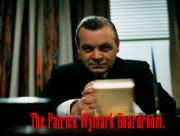
The Plane Makers
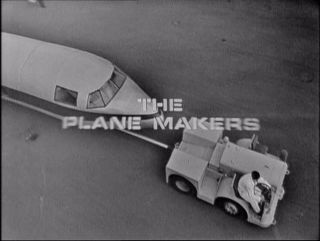
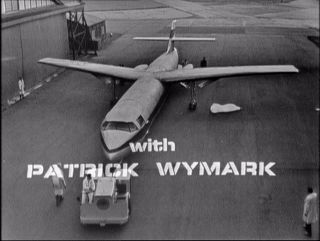
The Plane Makers. First broadcast on 4th February 1963, this ATV series ran for three years and 58 episodes. Set in the Scott-Furlong aircraft company, the first series was effectively an anthology of single plays with the common background of the construction of a new plane. Although actors and characters would appear in more than one episode, there was no continuing story or dominant character.
Pre-publicity in the week before the first episode quoted producer Rex Firkin as saying that the series was open-ended, "We haven't set a limit to the number of episodes yet." Significantly, Firkin was also quoted as saying that, "There will be no regular cast in the early instalments but as time goes on a hard core of regulars - like the managing director - will emerge and will of course be played by the same actor."
Producer Rex Firkin had been tasked by Lew Grade, managing director of Associated Television, with creating a down-to-earth factory setting for a TV show. Independent Television Authority rules meant that the factory could not produce anything which might be advertised on TV, which brought it down to a short list of ship building and aerospace.
(Firkin relates the background to The Plane Makers in his book High Drama)
There had been a handful of books and movies dealing with the aviation industry which provide interesting contrasts with the series - these are covered in Before The Plane Makers
Wilfred Greatorex was a former reporter for the Blackburn Times, and assistant editor of John Bull, before contributing scripts to series such as Probation Officer and Danger Man. Firkin had realised that The Plane Makers needed a running cast to hook the audience for the second series, so Greatorex engineered a continuing storyline, shifting the emphasis to the boardroom and introducing Wilder and Wymark. Although the series continued to feature one-off characters facing their 'moment of truth', the stories now rested on Wilder's urge to push himself and the development of a new plane forward, tempered by methodical test pilot "Auntie" Forbes (Robert Urquhart) and Yorkshire-born Factory Manager Arthur Sugden (Reginald Marsh). Greatorex was quoted as saying, ""Up North it's to do with fair dealing, but in London it's all to do with power" which makes it tempting to see Marsh's character as more representative of Greatorex's viewpoint.
However, as H.R.F. Keating observed in the Catholic Herald, "Wilder..moves on from being the man you love to hate to being the man you hate to love but cannot help according an undue measure of human sympathy."
The revised Plane Makers was a success. Although it went on to a third series, this focused more on the executive and political level, with few of the blue collar characters from the first two series. It is said that ATV's chief Lew Grade felt viewers who worked in factories would not want to come home and watch a TV show about a factory. It is also said that the production team felt that every aspect of the aviation industry had been exhausted. Whatever the reason, The Planemakers was brought to an end in the knowledge that John Wilder would continue.
Season 1
Feb. 4, 1963 Don't Worry About Me
Written by Edmund Ward, directed by Quentin Lawrence.
The only surviving episode of this season (available on volume 1 of the Planemakers DVD) following the work of the Scott Furlong company as it constructs the SF200 airliner.The introductory episode features the efforts of training officer Gordon Rollings to steer apprentice metalworker Ronald Lacey towards a design job. Colin Blakely plays Jack Clement, one of the best craftsmen and "one of the biggest chancers" on the Scott Furlong shop floor. The episode weaves in several other characters such as a new safety officer and itinerant metal-worker Joe Carter (Dickie Owen) trying to avoid his wife's maintenance claims. The factory is the ATV Elstree studio, famous as Harlington-Straker in the TV series UFO and now under BBC ownership as the hospital in Holby City.
Feb 11 1963 Always Another Saturday. Writer Richard Harris, director James Ferman. "Most people take life as it comes, but there is a question that Tony Hastings (Frank Jarvis) is afraid to ask." With Christopher Beeney as Maurice Frame, Johnny Briggs as Den, Paul Dawkins as Ernie.
Feb. 18, 1963 Them: Or Us? Writer Robert Holles, director Peter Sasdy. Davey Rankin (John Meillon) is a militant shop steward in his union. Davey is used to fighting other people's battles but when it comes to his own fight his integrity is challenged. With Annette Crosbie as Brenda, Meredith Edwards as Bert Griffin, Jerome Willis as Alf Winter.Harry Webster as works manager Mr Anstrell.
Feb. 25, 1963 You Can't Beat the System With John Junkin as shop steward Dusty Miller (who would return in season 2)
Mar. 4, 1963 The Silent and the Damned Writer Richard Harris. Director James Ferman.Michael Coles as Johnny, Harry Webster as Mr Anstrell.
Mar. 11, 1963 The Dividing Line. Writer Robert Holles, director Cecil Petty. Robert Haig-Allen (Michael Bangeter) puts on a staff dance to prove management and operatives can mix socially. With John Meillon as Davey Rankin and Annette Crosbie as Davey's ex-fiancee Brenda.
Mar. 18, 1963 The Short Run.Writers Geoffrey Bellman and John Witney. Director Geoffrey Nethercott. "For Don Cotter (Gary Watson) working in the drawing office, an unexpected vacancy could provide a final chance to plan his life. With Richard Vernon as Leonard Boaze. Robert Cartland as Wolfgang Katz.
Mar. 25, 1963 Has Anybody Seen Costigan? Written by Edmund Ward Harry Costigan , played by Gerald James, would return in season 2. When works manager Mr Anstrell (Harry Webster) notices some of Costigan's activities, it stretches in ingenuity to the limit.
Apr. 1, 1963 Lover Come Back Writer Richard Harris. Director James Ferman Anthony Booth plays Frankie Baxter, a singing star who has to return to his old trade at the aircraft factory when his popularity fades. There he meets a man who bears a grudge he nver bargained for. With Kenneth J Warren, Renny Lister and Reginald Marsh playing a character called Wally .
Apr. 8, 1963 Point of Contact. Writer Ken Taylor, director Cecil Petty Tom Barnsley (Brian Murray) meets secretary Sue Collins (Jane Merrow) and thinks it's the start of something big. But she has other plans.
Apr. 15, 1963 The Testing Time. Writer Bill Craig, director Geoffrey Nethercott. As the Easter breaker approaches, Works Manager Mr Anstrell (Harry Webster) hands over control to his deputy, Geoffrey Berger (Leonard Sachs) but does not foresee the crisis that develops. With Vincent Ball as Nelson, Anne Pichon and Tom Macaulay as Cunliffe (who would return in the second series).
Apr. 22, 1963 The Veteran Writer Robert Holles, director Herbert Wise. When the wrong issue from stores occurs, an operative seizes the chance to settle his grievance with the storesman. J.G.Devlin as Arthur Cooper.Jeremy Kemp as Bill Casby, Martin Boddey as Cyril Bridges.
Apr. 29, 1963 One of Us
May 6, 1963 Who Goes First? Writer Richard Harris. Director James Ferman. Two in five men face unemployment as the threat of job cuts hits Scott Furlong, but for capstan operator Den Heath (Johnny Briggs) redundancy could be key to his own crisis. With Harry Webster as Mr Anstrell, Tom McCauley as Mr Cunliffe (who would return in the second series as one of Wilder's board), Frank Jarvis as Tony Frame, Julia Foster as Sue Barnes, Ivor Salter as Ted Barnes and John Junkin as union convenor Dusty Miller.
May 13, 1963 The Blunt Approach
May 20, 1963 One of Those Days. Writer Edmund Ward. Director Quentin Lawrence.
Hidden resentments come to the surface between workers and management when tempers fray. With William Hartnell as Wally Griggs, Michael Williams as Stephen Allsop, Anne Cunningham as Marian Allsop. Michael Williams appears by permission of the Governors of the Royal Shakespeare Company.
May 27, 1963 A Good Night's Work. Writer Peter Draper. Director James Ferman Junior executive John Rodway (Alec McCowen)finds himself on an unexpected night out with a South American woman. His future depends on the success of the evening. With Erica Rogers as Anna, Ronald Radd as Mr Samaranga, Tom McCauley as Cunliffe and Wendy Gifford as Sue Rodway.
Season 2
Sep. 16, 1963 Too Much to Lose
Written by Edmund Ward, directed by Quentin Lawrence
With Patrick Wymark as John Wilder
With a shift of emphasis to the boardroom, the title sequence has changed from the documentary shots and jazzy theme of the first season to Trevor Duncan's stately march as the completed SF200 aircraft is rolled into a hangar by technicians. The episode intoduces John Wilder, Managing Director of Scott Furlong, with power of executive decision but answerable to his board of directors .
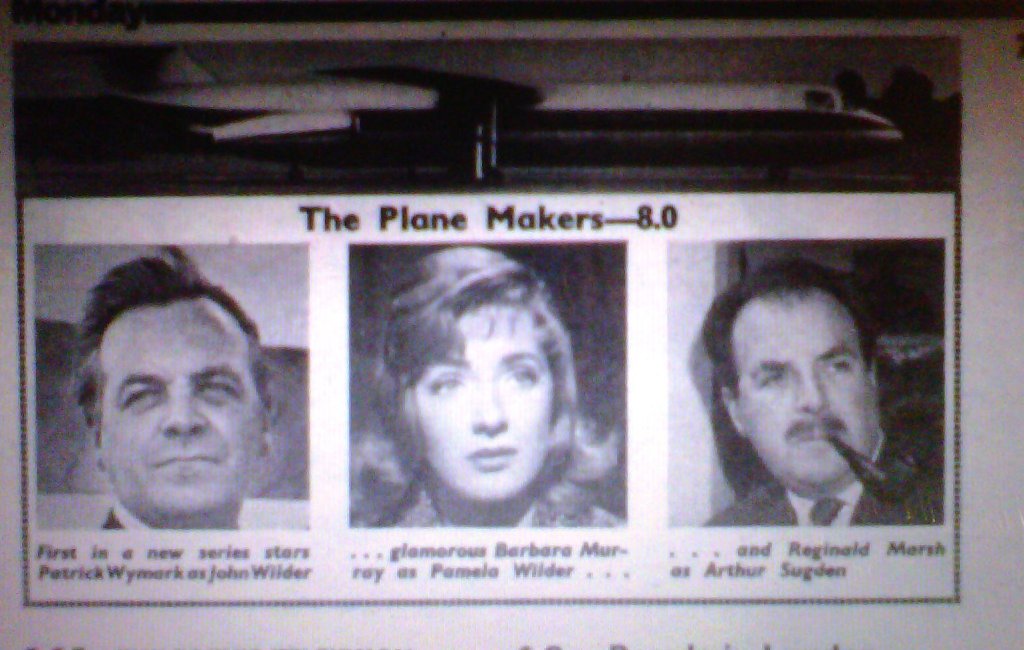
"This episode also introduces works manager Arthur Sugden (Reginald Marsh) and test pilot "Auntie" Forbes (Robert Urquhart). When Wilder learns that his French competitors have a test flight planned, he orders the Sovereign to be tested first, whatever the risk.For a longer Episode Review click here
Oct. 7, 1963 All Part of the Job
Written by Richard Harris, directed by James Ferman
&For a longer Episode Review click here
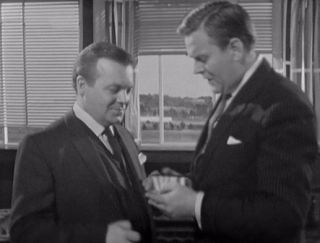
Oct. 21, 1963 Old Boy Network
Written by Edwin Ranch, directed by John Cooper
For a longer Episode Review click here
Oct. 28, 1963 Any More for the Skylark?
Written by Peter Draper, directed by James Ferman
Also features Isobel Black, John Woodvine, Rodney Bewes and Barbara Windsor.
For a longer Episode Review click here
;
Nov. 5, 1963 A Matter of Self Respect
Written by Leslie Sands, directed by John Cooper
For a longer Episode Review click here
Nov. 12, 1963 Costigan's Rocket
Written by Edmund Ward, directed by John Nelson Burton
For a longer Episode Review click here
Dec. 3, 1963 Strings in Whitehall
Written by Wilfred Greatorex, directed by Quentin Lawrence
For a longer Episode Review click here
Dec. 10, 1963 The Best of Friends
Written by Lewis Davidson, directed by James Ferman
For a longer Episode Review click here
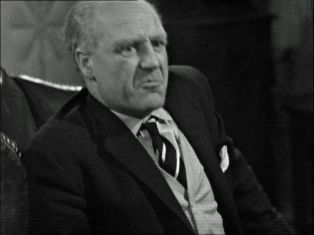
Dec. 24, 1963 One Out: All Out!
Written by Leslie Sands, directed by Peter Sasdy
Sir Gordon Revidge refuses to finance the expanded Sovereign project but Wilder has already cancelled a missile programme to free up the staff.
For a longer Episode Review click here
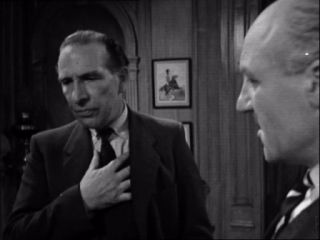
Jan. 7, 1964 A Bunch of Fives
Written by Peter Nichols, directed by James Ferman
For a longer Episode Review click here
James Villiers plays Harvey Graves, a bright executive pushed into a job at Scott Furlong through boardroom influence.For a longer Episode Review click here
Jan. 21, 1964 In the Book
Written by Arthur Swanson, directed by Dennis Vance
For a longer Episode Review click here
Jan. 28, 1964 Miss Geraldine
Written by John Gray, directed by John Cooper.
John Wilder plans to expand Scott Furlong's airfield but meets opposition from 69 year old Miss Geraldine whose Tudor home is in the way.For a longer Episode Review click here Feb. 4, 1964 A Condition of Sale Feb. 18, 1964 A Paper Transaction Mar. 3, 1964 A Matter of Priorities Mar. 17, 1964 The Homecoming Volume 3 of The Plane Makers DVD Oct. 20, 1964 Empires Have to Start Somewhere Written by Edmund Ward, Directed by Peter Collinson A new title sequence heralds a new direction for the Plane Makers. The Vertical Take Off and Landing Jet shown in the title sequence is the new focus of Wilder's ambition. The brain child of David Corbett (Alan Dobie), the VTOL jet is being developed by Ryan Airframes. Part of the same group as Scott Furlong. In the course of the episode, Wilder schemes to bring Corbett and the new jet under his control. Described by Henderson as, "Very technical. Drinks lemonade. Not really my type." Corbett is single-minded, apparantly lacking in social or political graces. Alan Dobie had been a student with Patrick Wymark at the Old Vic Theatre School, and a year before had played the Revenue Solicitor persecuting Wymark's Joseph Ransley in Alias The Scarecrow. Oct. 27, 1964 Other People Own Our Jungles Now Wilder tells Henderson to concentrate on sales of the VTOL jet. Sales of the Sovereign are declining. "Either we expire gently with the Sovereign or blast off with the VTOL and stay in business." For a longer Episode Review click here Wilder pushes for the VTOL jet to go into production, but Corbett wants funding for further development and attempts to use a journalist (Garfield Morgan) and an MP (Philip Latham) to get his own way.For a longer Episode Review click here Written by Raymond Bowers, directed by James Ferman James Cameron-Grant is drawn into the conflict between Wilder and Sir Gordon Revidge. For a longer Episode Review click here Written by Wilfred Greatorex, directed by George More O'Farrell Wilder tries to negotiate the VTOL contract with the Government without interference from Corbett. Arthur Sugden (Reginald Marsh) and Henry Forbes (Robert Urquhart) are now just bystanders in the conflict between Wilder and Corbett.For a longer Episode Review click here Nov. 24, 1964 It's a Free Country - Isn't It? Written by Edmund Ward, directed by John CooperFor an Episode Review click here Dec. 1, 1964 A Question of Supply Written by Arthur Swinson, directed by Josephine DouglasFor Episode Review click here Dec. 8, 1964 The Flying Frigates Written by Raymond Bowers, directed by Eric Price Written by David Weir, directed by John Cooper Written by John Gray, directed by James FermanFor Episode Review click here Written by John Gray, directed by Peter CollinsonFor Episode Review click here Written by Raymond Bowers, directed by Eric PriceFor Episode Review click here Written by Edmund Ward, directed by James FermanFor Episode Review click here This episode brings The Plane Makers to a conclusion.
Written by Tony Williamson, directed by James Ferman.For a longer Episode Review click here
Written by Stanley Miller, directed by Bill Stewart.For a longer Episode Review click here
Feb. 25, 1964 A Job for the Major
Written by John O'Toole, directed by John CooperFor a longer Episode Review click here
Written by Raymond Bowers, directed by Eric PriceFor a longer Episode Review click here
Mar. 10, 1964 Bancroft's Law
Written by Geoffrey Stephenson, directed by Bill StewartFor a longer Episode Review click here
Written by David Weir, directed by John Cooper.
Arthur Sugden receives a tempting job offer from old friend Bill Ingram. It would allow Arthur and his wife to return to Yorkshire and comes just at a time when Wilder has rejected a scheme he has been working on.For a longer Episode Review click here
Mar. 24, 1964 Sauce for the Goose
Written by David Weir, written by Eric PriceFor a longer Episode Review click here
Mar. 31, 1964 How Can You Win If You Haven't Bought a Ticket?
Written by Edmund Ward.
(Final episode on volume 2 of the Plane Makers DVD)For a longer Episode Review click here
Season 3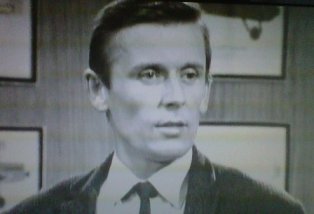
Written by Raymond Bowers, directed by John Nelson-Burton
Nov. 3, 1964 A Lesson for Corbett
Written by David Weir, directed by Quentin Lawrence
Nov. 10, 1964 The Golden Silence
Nov. 17, 1964 The Island Game
For Episode Review click here
Dec. 15, 1964 Only a Few MillionsFor Episode Review click here
Dec. 22, 1964 The Salesmen
Patrick Wymark also appeared in "Once A Jolly Swagman" at 2pm on December 25 1964
Dec. 29, 1964 Appointment in Brussels
Jan. 5, 1965 A Hoopla of Haloes
Jan. 12, 1965 The Firing Line